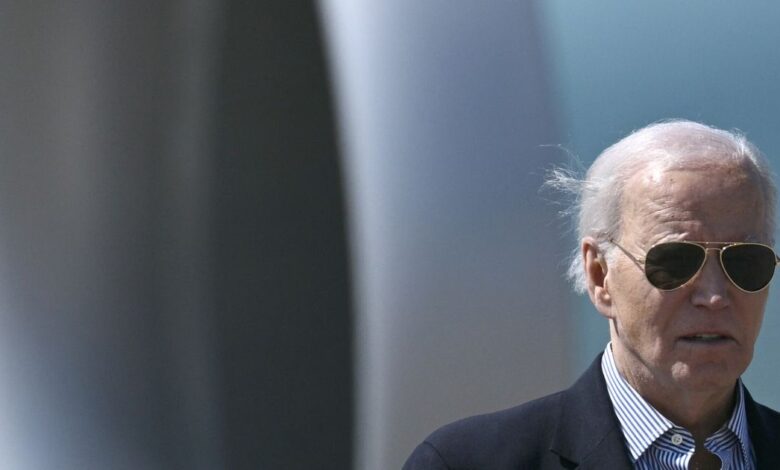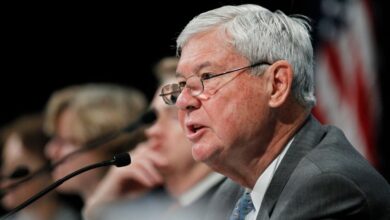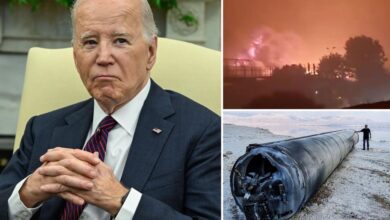Palestinian Physician Walks Out Of White House Meeting

An emergency room physician who spent three weeks volunteering at Al-Nasser Hospital in Gaza earlier this year on Tuesday walked out of a White House meeting in protest of how the administration has handled the war.
Thaer Ahmad was among the dozen or so people who were invited to the White House for a scaled-back meeting with President Joe Biden, Vice President Kamala Harris, national security adviser Jake Sullivan, and senior White House aides.
“It was disappointing that I was the only Palestinian in attendance, and out of respect for my community who is mourning and suffering,” Ahmad told HuffPost. “I told the president that I’m going to leave. He told me he understood why I needed to leave.”
Ahmad, a Palestinian American based in Chicago who plans to return to Gaza on another humanitarian trip, recounted his experience in Gaza during Tuesday’s meeting and emphasized the need for more aid. He also said he told the president that the U.S. needed to firmly stop the looming invasion of Rafah, the southern border city where over a million people are seeking refuge.
“I was in Gaza, I tried to do everything I can to help my people there. But unfortunately, it wasn’t enough, the situation has gotten worse. Our community is reeling, we are in the state of mourning, we need the President to intervene and demand a ceasefire. I have a tremendous amount of survivor’s guilt. And I know many Palestinian Americans feel the same way,” said Ahmad.
“I was firm, candid and respectful. I hope that my message was received. And I hope my tone of urgency came across,” he added.
The policy meeting to discuss the crisis in Gaza, which was followed by a small dinner predominantly for Muslim White House staffers, was held in place of an iftar — the breaking of the daily fast after sundown — commemorating Ramadan. The administration had been conflicted over whether to host an iftar and struggled to find attendees because many Muslim Americans refused to join due to their frustrations over the war in Gaza.
“This was actually a request from members of the community. This is what they wanted, and we understand that,” White House press secretary Karine Jean-Pierre said of the decision to host a meeting instead of an iftar. “We listened, we heard and we adjusted the format to be responsive so we can get feedback from them.”
One Palestinian Muslim person who was invited to the White House event but ultimately decided not to attend told HuffPost that invitees had indeed demanded the administration host a policy discussion rather than an iftar, saying an iftar was inappropriate amid reports of famine in Gaza. The invitee called the iftar “a patch job” and said the White House’s attempts to meet with Palestinian and Muslim individuals were “out of touch.”
“There is a way to engage Jewish, Arab, Palestinian and Muslims in this country on this issue, but they don’t know how,” said the individual.
Emgage, a Muslim voting advocacy group, released a statement saying its leadership also had been invited to Tuesday’s meeting but ultimately refused to attend.
“Emgage is ready to support efforts that engage in a substantive manner on the above priorities. However, without more Palestinian voices and policy experts in the room, we do not believe today’s meeting will provide for such an opportunity,” the organization said.
In recent months, Muslim, Arab and Palestinian leaders across the country have rejected a series of meetings with top administration officials, criticizing their handling of the humanitarian crisis in Gaza. Muslim and Arab groups have also led protest votes during the Democratic primary, encouraging people to vote “uncommitted” rather than support the president’s reelection campaign.
There is a long history of the White House hosting iftar dinners. In 2017, Donald Trump became the first president in about two decades to break the tradition, but the dinners resumed under his administration in 2018 and 2019. Biden hosted his first iftar celebration virtually, due to restrictions by the COVID-19 pandemic. Last year, the White House did not hold an iftar dinner but hosted nearly 350 people for a reception celebrating Eid al-Fitr, a festival marking the end of Ramadan.
Get Best News and Web Services here







